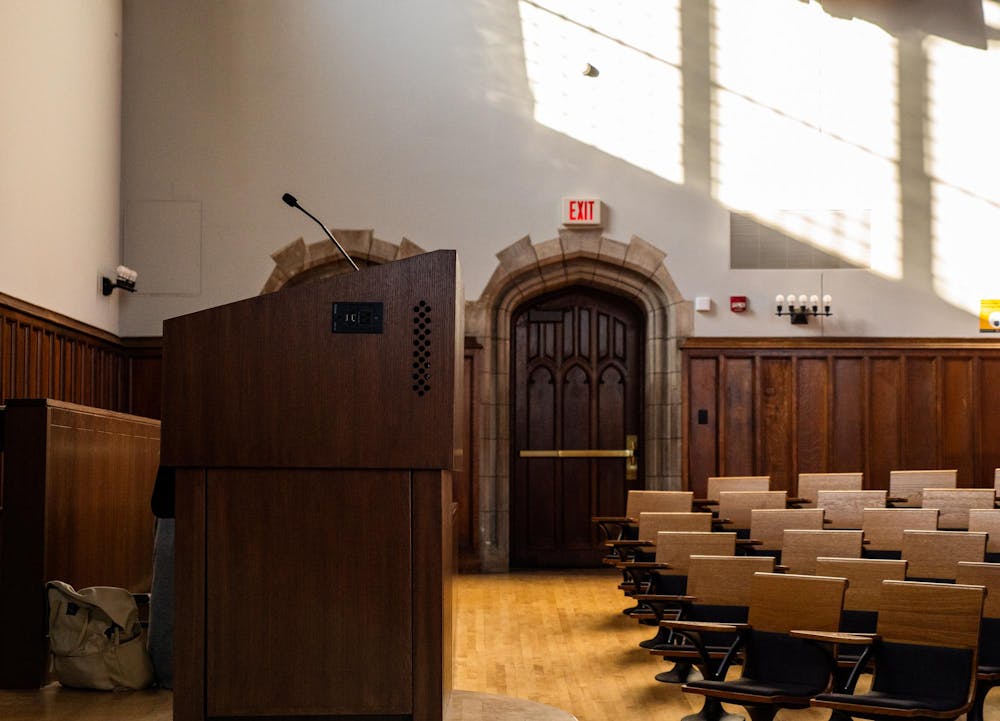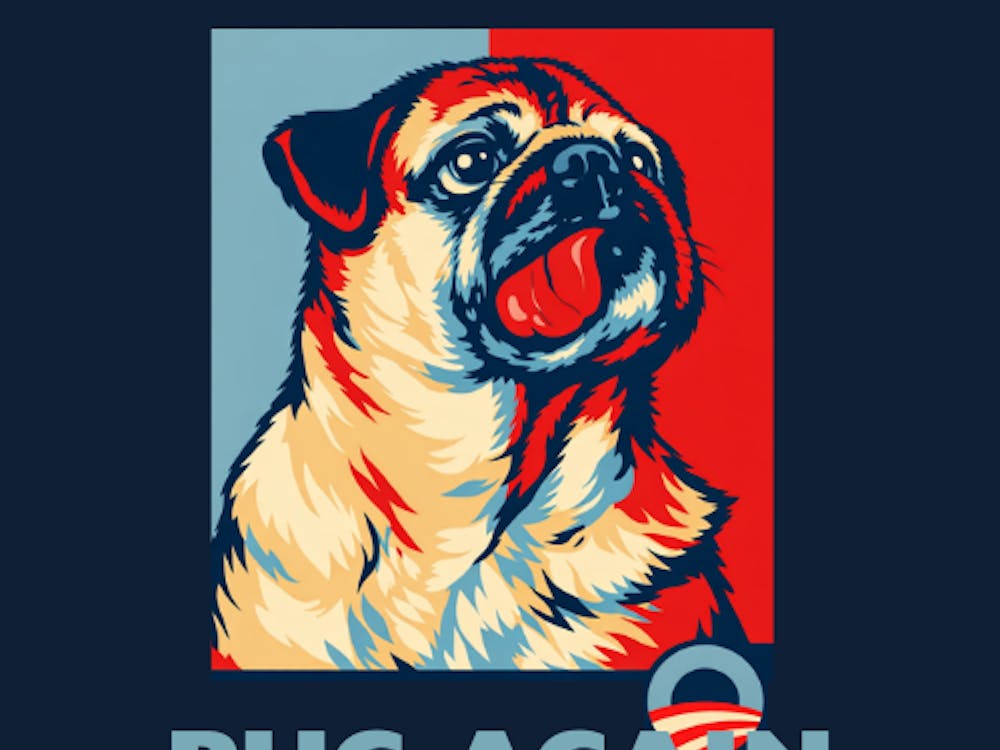The long-running debate about whether or not universities should release statements on national and global events debate has been thrust into the limelight with recent Supreme Court decisions on affirmative action and abortion, as well as international conflicts that impact members of the student body. The recent conflict in Israel and Gaza, for instance, has placed considerable pressure on universities across the nation regarding their official statements, and different University leaders have taken different stances on how to respond.
While some expect academic institutions to speak out on contentious issues, others fear that in doing so, universities establish doctrines that stifle meaningful debate among members of their community. The Daily Princetonian examined the past, present, and future discussions surrounding institutional speech at the University. Most recently, President Christopher Eisgruber ’83 tasked a group with crafting guidelines for institutional speech, including statements from departments or administrative units, in a letter last fall, but no guidelines have yet been approved.
There is a critical distinction between free speech and institutional speech — two terms that are often confused. Shamus Khan, Sociology and American Studies professor, offered definitions of the two terms in an interview with the ‘Prince.’ Free speech, he said, pertains to the speech of an individual or a group of individuals — such as a student or a subgroup of faculty within a department — that represents beliefs in their own name. On the other hand, he explained that institutional speech refers to the “speech of an organization” — for example, Princeton University or the Princeton School of Public and International Affairs (SPIA), or potentially leaders of those institutions, when they invoke their position in order to represent the beliefs of the organization as a whole.
Some professors, especially conservatives and free speech advocates, advocate for a principle of institutional neutrality, the principle that universities should not take positions on any issue in order to foster a welcoming environment for all forms of free speech. University President Christopher Eisgruber ’83 has instead pursued a policy which he has termed institutional restraint — the principle that universities are not neutral, but instead value-laden institutions that can take positions in rare cases when the core values of the university are under threat. Eisgruber has also defended the right of administrators to speak in their personal or academic capacities.
Proponents of institutional neutrality urge the University to adopt the Kalven Report, a policy produced by a faculty committee at the University of Chicago that establishes a university as “the home and sponsor of critics” and “not the critic itself.” Some members of the University community have also endorsed the James Madison Program’s Princeton Principles for a Campus Culture of Free Inquiry, which argues that universities have “a special fiduciary duty to foster freedom of thought for the benefit of the societies that sustain them.” Neither the Kalven Report nor the Princeton Principles have been formally accepted by the University. The University has adopted the Chicago Principles as its guiding principles for its commitment to free speech.
On the other hand, some have argued that the University has a responsibility to speak out and protect groups that have been marginalized in the past, especially in relation to politicized topics such as race, gender, and sexuality.
Danielle Shapiro ’25, president of the Princeton Open Campus Coalition, wrote in an email to the ‘Prince’ in favor of institutional neutrality: “The Princeton Open Campus Coalition opposes University statements on current events. That said, the University has, despite our opposition, made statements on current events for years now, whether it be the war in Ukraine or the death of George Floyd. As such, should the University make a habit of making moral statements, it ought to do so consistently."
On the flip side, Song Ting Tang ’27, a prospective SPIA major, emphasized the importance of institutional restraint, saying, “I personally support institutional restraint more because Princeton is a place of intellectual community. If Princeton follows institutional neutrality, then a lot of the students and faculty are going to protest because they’re going to feel like the University is being irresponsible by not taking a stance.”

Tang is a contributing Copy editor for the ‘Prince.’
Proposed guidelines for institutional restraint
Historically, the University has taken the approach of institutional restraint, commenting on certain current events, but only rarely. Eisgruber characterized this stance in a 2022 Princeton Alumni Weekly (PAW) piece, stating that he retains “a presumption against commenting on social, moral, or political topics” in order to follow the University’s mission to remain “an impartial forum for vigorous, high-quality discussion, debate, scholarship, and teaching.”
Still, Eisgruber and the University administration adheres to the precedent set by William G. Bowen GS ’58, who served as University President from 1972–1988, that “[Princeton] is a value-laden institution” whose aims are difficult to describe using the word “neutrality.” Eisgruber wrote in the PAW that there are rare cases in which he chooses to “reaffirm or elaborate values that are fundamental to our community or mission.” The values, according to Eisgruber, align with what past University President Robert Goheen ’40 called the “basic tenets” of the University, such as “commitments to racial equality and inclusivity.”

Last year, Eisgruber tasked Khan to lead a subcommittee within the Faculty Advisory Committee on Policy regarding statement-making by units of the University. The policy recommendation, Khan describes, aligns with the principle of institutional restraint.
According to Khan, the two indispensable conditions are “silence is untenable” and “the statement would be critical to the functioning of the unit.”
The committee, under Khan’s leadership, met over the course of the 2022–23 academic year, with an open comment period during March, and issued a final policy recommendation in April that outlined a set of questions that must be asked and conditions that would need to be met in order for a statement to be made.
“The condition that silence is untenable should set an extremely hard bar for making a statement,” Khan said. “The desire to speak is insufficient for making a statement. It’s not that you want to say something, it’s that you cannot bear being quiet.”
While the policy recommendation would permit space for the University to speak, Khan maintains that the “exceptionally high” requirements outlined by the two conditions would render statements rare. Additionally, the proposal is aimed solely at the speech of institutions, meaning that the free speech of students was not subject to the policy; as long as student groups follow the codes of conduct outlined in Rights, Rules, and Responsibilities, student speech and activism would face no restraints from the policy recommendation.
“Student groups were seen not as being part of an institutional voice, but actually just student groups,” Khan explained. “So if a student group decided to speak in any way, they would have, under our policy, any and every right to speak.”
Khan continued, “That doesn’t mean that student groups couldn’t violate codes of conduct for the student body.”
However, during the vote on the policy proposal on May 15, the meeting was adjourned due to the absence of a quorum. In response to the policy recommendation introduced under Khan’s leadership, University spokesperson Michael Hotchkiss stated in an email to the ‘Prince’ that “the policy has been referred back to the Faculty Advisory Committee on Policy for possible further consideration,” and no policy is currently in place.
The case for neutrality
Politics professor Keith Whittington — a project participant and signed endorser of the Princeton Principles — is a strong proponent of institutional neutrality. He criticized Khan’s policy recommendation.
“It’s left completely to this subjective perspective of individuals in the department as to whether or not they think that's true,” Whittington said in an interview. “If you are serious about the ‘silence, untenable’ standard — and I think it’s a reasonable standard … I think you need a different set and more specific set of decision rules,” Whittington said.
The decision rules mentioned by Whittington refer to a set of defined procedures that can implement the ‘silence is untenable’ condition in practice — such as a rigorous requirement like conducting a vote for when an institution makes a statement. Although Whittington ultimately supports total neutrality, Whittington believes a stance of restraint should at least limit institutional statements to those meeting a very high bar.
“That looks like a much more serious mechanism for utilizing this idea of institutional restraint, and will make it relatively unlikely that departments will be issuing political statements on things that are genuinely controversial in their departments,” Whittington explained. “They will mostly be issuing statements in contexts in which there is, in fact, widespread agreement. And moreover, presumably acknowledged or widespread agreement, there’s a real intensity of people thinking this needs to be said in this context.”
Whittington’s preference is to ban statements altogether to preserve institutional neutrality. In response to recent controversy on Harvard’s on what statement the University should make on the conflict in Israel and Gaza, Whittington noted that many universities have found themselves in a no-win situation.
“I think one of the challenges we’re seeing is that if you have a history of issuing lots of political statements, every time you choose not to issue a statement, that’s going to come under scrutiny because you’re making a choice not to issue a statement,” Whittington explained.
Whittington has announced his plans to leave Princeton at the end of the academic year to teach at Yale Law School and spearhead a new center dedicated to free speech and academic freedom.
Pressure to issue statements
University administrators, however, often face pressure to issue statements, especially on contested issues. In spring 2022, hundreds of students signed an open letter urging the University to take a public stance on the war in Ukraine, including students from the region.
There have been a few instances of statements released by the Office of the President in which Eisgruber defines the University’s stance on certain political issues. On May 31, 2020, in the “Statement from President Eisgruber on the Killing of George Floyd and the Importance of Confronting Racism,” Eisgruber denounced racial injustice and brutality and called for members of the Princeton community to promote inclusivity and equality.
More recently, in his Statement on Terrorist Attacks and War in the Middle East, Eisgruber condemned the actions of Hamas and the violence associated with war. In addition to Eisgruber’s statement, the SPIA Department posted on YouTube a statement from SPIA Dean Amaney Jamal, condemning the “atrocious violence” committed by Hamas and conveying her horror at “the brutal attacks on innocent Israeli citizens by Hamas.”
Whittington and others have argued that an individual’s speech can be classified as institutional speech, especially if the individual invokes their formal position within an organization. To them these on-the-edge cases, expressing that statements from formal entities of the University, including senior leadership positions like the President, the Provost, or the Dean, can blur the lines between free speech and institutional speech. Eisgruber, on the other hand, has defended the right of administrators to speak on their own behalf.
Because many of these political controversies are closely tied to the policy that SPIA studies, the department often finds itself under particular pressure to make a statement. However, in a Nov. interview with a 'Prince,' Jamal has said ultimately believes in the importance of the University and its faculty in taking the initiative to educate and provide diverse perspectives to students.
In an email to the ‘Prince,’ Jamal characterized her own views on institutional speech, saying, “I think carefully before making a statement on world events in my role as dean, and I am guided by Princeton’s tradition of institutional restraint and by President Eisgruber’s approach to these challenging situations.”
Judy Gao is a contributing Features writer for the ‘Prince.’
Coco Gong is a contributing Features writer for the ‘Prince.’
Please direct any correction requests to corrections[at]dailyprincetonian.com.








